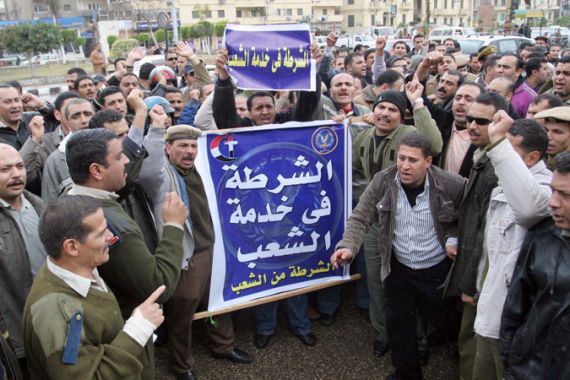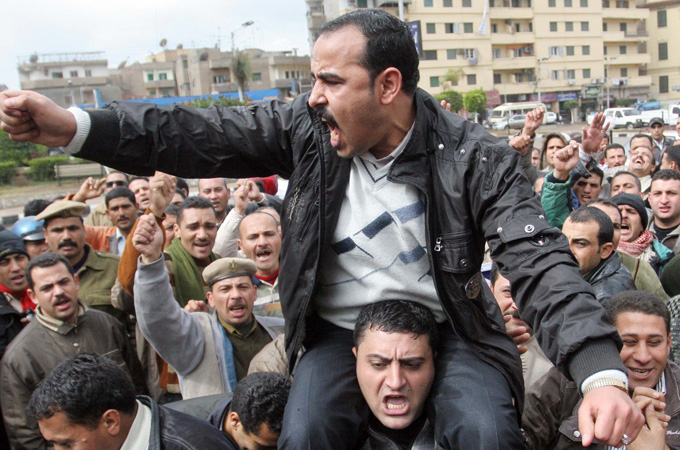Egyptians defy call to end strikes
Airport and textile workers among those refusing to heed military’s appeal not to protest.

 |
| Police are among those protesting, demanding higher wages and better conditions [AFP] |
Emboldened by the overthrow of President Hosni Mubarak last week, Egyptians have been airing grievances over issues ranging from low wages to police brutality and corruption.
Workers in banking, transport, oil, tourism, textiles, state-owned media and government bodies are striking to demand higher wages and better conditions, said Kamal Abbas of the Centre for Trade Union and Workers’ Services.
Staff at Cairo airport and in the textile industry were among those who on Wednesday defied the call by Egypt’s new military rulers to stop all protests.
While hundreds of airport employees protested inside the arrivals terminal for better wages and health coverage, in the industrial Nile Delta city of Mahallah al-Koubra, more than 12,000 workers at a state-owned textile factory went on strike over pay and calls for an investigation into alleged corruption at the factory.
In Port Said, a coastal city at the northern tip of the Suez Canal, about 1,000 people demonstrated to demand that a chemical factory be closed because it was dumping waste in a lake near the city.
Banks closed
In sectors not hit by strikes, the central bank’s decision to keep banks closed was forcing many to scale back production because clients were unable to pay for the goods.
 |
| Click here for more of Al Jazeera’s special coverage |
The military had urged Egyptians on Monday not to strike and appealing to their sense of national duty in what was seen as a final warning before an outright ban on strikes and protests.
Pro-democracy leaders plan a big “Victory March” on Friday to celebrate the revolution.
Meanwhile, the health ministry said at least 365 people were killed during the 18-day uprising that began on January 25. It said 5,500 people had been treated for injuries and that the death toll could rise as the government is still gathering information.
Rights groups say hundreds are still missing after the protests.
Gamal Eid, a lawyer who heads the Arabic Network for Human Rights Information, said: “There are hundreds of detained, but information on their numbers is still not complete … The army was holding detainees.”
In Tahrir Square, the focal point of the revolt, traffic flowed on Wednesday and some of the army tanks and armoured vehicles had been pulled back, although military armour remained in other Cairo locations.
Given the instability around the country, authorities decided to put back by another week the reopening of schools and universities across the country.
Schools and universities were just starting their midyear break when the protests broke out in January.
Council formed
Some protest organisers said on Wednesday they had formed a “Council of Trustees” to negotiate on the country’s transition to democracy with the ruling military council.
“The head of the regime is gone but the body of the regime is still here,” Abdullah Al-Ashaal, a former ambassador and a university professor, told a new conference announcing the formation of the council. “I’m worried there is much uncertainty about this transitional period.”
The council’s membership includes political scientist Hassan Nafaa, Judge Zakaria Abdel-Aziz, Mohamed el-Beltagi of the Muslim Brotherhood, Khaled Abdel-Qader Ouda, an academic, author Alaa el-Aswany, and veteran television presenter Mahmoud Saad, among others.
Meanwhile, a committee set up to amend the constitution as a prelude to parliamentary and presidential elections in six months has met as the military dismantles mechanisms used
to maintain Mubarak’s rule. The military council has already dissolved parliament and suspended the constitution.
Egypt also imposed travel bans and froze the assets of another former cabinet minister and two more businessmen on Wednesday.